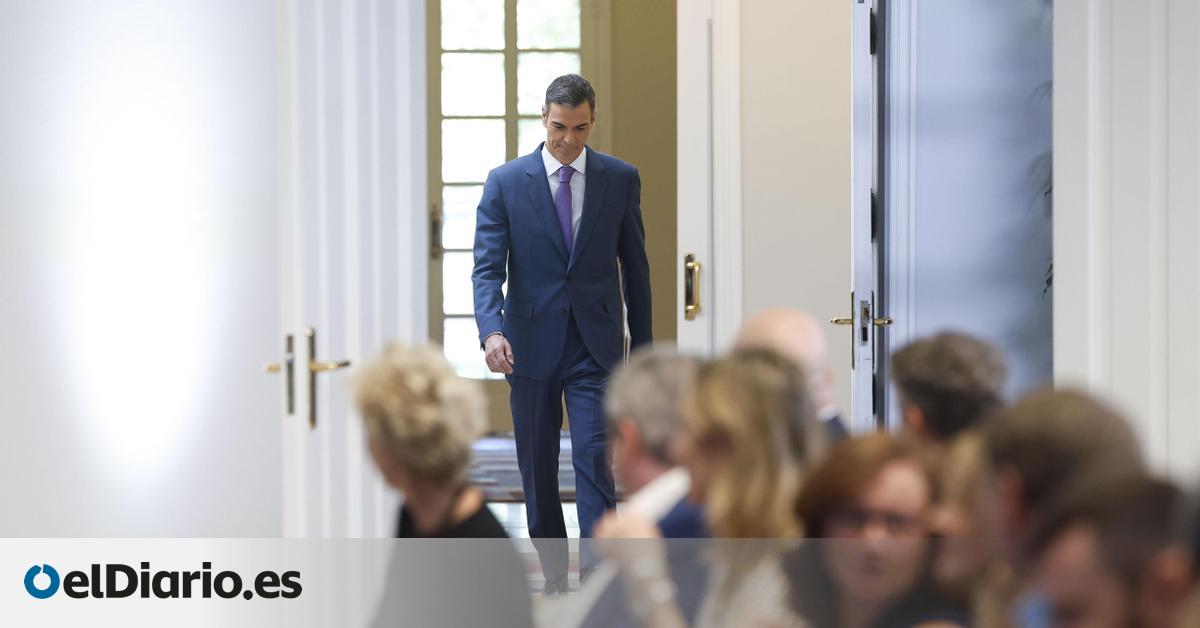
“We have a government partner that is to add. The rest are groups that sometimes vote with us and other times do not vote.” The president of the Government, Pedro Sánchez, thus summed up in his balance appearance of the political course the parliamentary reality he faces in this legislature. He referred to the fluctuating majority that has allowed him to get some laws, but that has also caused a few defeats. In these first two years of legislature, the barrier that marks its Ecuador, the Congress has approved 24 laws and 18 decrees-law, a production less than that of the past legislature and that looks a lot like that of the second mandate of Mariano Rajoy, which also did not tell a clear majority and that ended in a successful motion of censure.
Sánchez has given continuous signs that this parliamentary reality does not bother him to continue governing. The Government defends that it has already fulfilled almost half of the 200 commitments that it has acquired since it launched, 45%. And cling to a fact: “We have won 86% of the voting.” “We are halfway, there is a lot of work and a lot of legislature ahead,” Sánchez said in his last press conference before the summer break. “The two years that remain until the generals of 2027 The coalition government faces them with the same determination and energy as in the previous seven years,” he advanced, with the commitment included to present a general budget project.
It is true that the defeats of the Executive in Congress are minority and that, as Sanchez also defended in that appearance, only their party and add are able to articulate a positive majority. Most of the times in which the PP has reached support beyond the extreme right has been to knock up votes and not to carry out its own initiatives.
But the government accumulates a series of blows to important votes. For example, in the last plenary session of the political course, with a package of measures to try to avoid a new blackout such as the one that affected the entire Peninsula on April 28. Sanchez lost the support of Podemos and Junts, and was unable to convince a much more interested PP in causing a new defeat to the Executive than in the content of a decree that could have seconded without problem.
However, that day the Executive did have vote – including those of the PP – to approve another decree on financing for the autonomous communities and one more about declaration of cultural interest. Three laws that arrived from the Senate and the two reforms of the Congress Regulations promoted by the PSOE and its parliamentary partners were also definitively approved.
In total, seven approved initiatives and a single defeat, although Sonora. With those incorporated data, the legislature adds 24 approved laws and another 18 decrees-law. That is, 42 initiatives that serve the government to try to dismantle the argument of the Popular Party that Sánchez is unable to take its measures forward. “I doubt that it can be celebrated having fulfilled when it is the government with less initiatives approved in the first two years,” said Alberto Núñez Feijóo in his own balance.
It is true that the data of this legislature are far from the legislative capacity shown by the previous PSOE and Unidos Podemos government, with a much more comfortable parliamentary majority. In its first two years, 2020 and 2021, that legislature illuminated 47 laws and 72 decrees-law. This high volume of decrees is related that those years were the first of the Pandemia by the COVID-19.
In fact, the numbers of this legislature are very similar to those of the second mandate of Mariano Rajoy, which between the end of 2016 and mid -2018 barely managed to carry out 21 laws – against what Feijóo says, less than Sanchez in these two years of legislature – and 33 decrees, a total of 54 initiatives. That legislature the PP started with many difficulties, thanks to an abstention of the PSOE, and ended it with a motion of censure promoted by a reborn Sánchez that managed to convince the PNV and the rest of the partners to lead a first solo government.
Feijóo has threatened several times in recent months with a motion of censure that, however, does not dare to present. Because, unlike that moment, neither the PNV nor together, the most to the right of the investiture block, seem willing to support a PP government that would necessarily have to have the support of VOX, well within the Cabinet of Ministers, either by pressing with its own legislative agenda.
This support of the partners is the one who gives the president air to trust that he will exhaust the legislature. And that is why the PP leader strives to point out those parliamentary groups to support the government. “Our obligation is to be prepared for the moment when the partners say ‘it’s over,” said Feijóo before going on vacation at a press conference to take stock of the political course.
The pending agenda: justice reform, reduction of working hours …
If the first year of the Legislature was marked by the processing of the Amnesty Law – recreationally endorsed by the Constitutional Court – the Government has had to face during this course the storm unleashed by the Santos Cerdán case without great initiatives to be approved in Congress. The great movements of the Executive have pivoted on the international agenda, with the announcement by Sánchez that he will carry the budget in defense to 2% of GDP, as he agreed bilaterally with the secretary general of NATO, Mark Rutte, at the last summit of the alliance.
The government has managed to get some measures forward. In recent weeks, for example, he approved in a second attempt the creation of a public health agency. The PSOE has also managed to promote a reform to prohibit associations that enhance Francoism and the groups of the investiture block agreed to reform the Congress regulations to sanction the behaviors of the extreme right agitators who usually burst the press wheels.
But the great measures planned for this year are still in process. The Congress will resume the activity in September with a loaded agenda. The Yolanda Díaz Ministry of Labor left the first parliamentary process of the Law for the reduction of day, pending a complicated negotiation with Junks for the next period of sessions. Add plans have not changed and expect the law to be permanently approved before the end of the year, if those conversations come to fruition.
The Government also has pending to begin to process the reform to democratize access to the judicial career. The Minister of Justice, Félix Bolaños, like Díaz, postponed the first debate in Congress until the next session. Bolaños has also advanced that after the summer break the Council of Ministers will approve the reform of the Criminal Procedure Law that will commission prosecutors to instruction of criminal proceedings. Both reforms have a strong opposition of conservative judicial associations.
One of the first measures that will be voted after that break will be the new parental permits. The Council of Ministers approved on Tuesday the decree after an intense negotiation between PSOE and add. The measure grants three more weeks of paid permits to both parents and takes 32 weeks permits for single -parent families.
… And budgets?
But the great challenge will be the general state budgets. Sanchez announced that he plans to present a public accounts project by 2026, something that confirmed his first vice president. “All budget processes are already launched in September,” said María Jesús Montero in her last appearance.
This means that in the new Treasury course you will have to activate a ministerial order to receive the requests from the rest of the departments and bring to Congress a new path of deficit and expense roof, two procedures prior to the presentation of the final project. Just a year ago that together the expense roof knocked down and that encouraged the government to present the accounts.
If Sánchez decides to bring his intentions until the end he will have to open a negotiation with the Catalan independentists, but also with Podemos, who has put as a condition for his support to lower the rentals of 40%, break relations with Israel and leave NATO. “We are going to work to approve,” said Sánchez.
Source: www.eldiario.es

